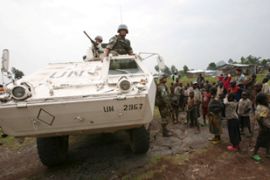DRC marks 50 years of independence
Ceremonies across the country celebrate end of Belgium’s colonial rule in 1960.

‘Moral revolution’
A civil war in DR Congo, beginning around 1998 and ending in 2003, left about three million people dead.
Despite a peace deal, violence, including sexual attacks and the recruitment of child soldiers, remains widespread, particularly in the country’s eastern regions.
Speaking in Kinshasa on Wednesday, Kabila called for a “moral revolution” in the country.
Addressing an audience including Ban Ki-Moon, the UN secretary general, Belgium’s King Albert II and more than a dozen African heads of state, Kabila said Congolese should put an end to “attacks on human life and dignity” and in particular the widespread cases of rape.
The president also singled out “tribalism, regionalism, favouritism, irresponsibility, theft, embezzlement of public property and everything else contrary to values”.
The UN has said that the DR Congo is experiencing “one of the worst humanitarian crises in the world” with two thirds of its 60 million inhabitants living on less than $1.25 per day.
Largest UN mission
Fighting, often over natural resources, continues in the eastern regions and Congo is the site of the world’s largest and most expensive UN peacekeeping mission, with more than 20,000 personnel in the country.
|
“The Congolese people are trapped in a limbo between an unsatisfactory peace and the threat of further approaching crises” Amnesty International |
The Congolese government has asked for UN forces to withdraw before September 2011.
Investments in the mining sector, including a $9bn deal with China where concessions are traded for schools, hospitals and infrastructure, have brought some basic services to citizens.
But a country that is so rich in potential, containing 30 per cent of the world’s cobalt and 10 per cent of its copper, remains desperately poor.
Amnesty International, the UK-based human rights group, said it was “nothing short of hypocritical for Congo to throw nationwide celebrations without acknowledging the appalling state of human rights in the country today”.
The events come just days after the funeral of Floribert Chebeya, a high profile human rights activist, whose body was found in his car one day after he was summoned to a meeting with Congolese police.
“The Congolese people are trapped in a limbo between an unsatisfactory peace and the threat of further approaching crises,” an Amnesty International spokesperson said in a statement.
Colonial history
The country was “created” in 1885 by King Leopold II of Belgium, who recruited the explorer Henry Morton Stanley to make a secret expedition to carve a state out of the heart of Africa.
The so-called Congo Free State was unique among colonies in that it became the private property of the Belgian king, who brutally exploited the area’s resources.
After an estimated four million people were butchered in Leopold’s quest to exploit the country’s rubber through a system of plantation agriculture, the king relinquished the territory to the Belgian government in 1908, who renamed it the Belgian Congo.
“Leopold II was a true visionary for his time, a hero,” Louis Michel, a Belgian who headed the EU’s development commission, said in a magazine interview this week that elicited widespread disgust in DR Congo and beyond.
After widespread rioting in 1959, and anti-colonial struggles that were sweeping Africa, the Belgians allowed elections for independence to go ahead in May 1960.
On the eve of independence, Congo had only three African managers in its civil service and 30 university graduates.
Authoritarian regime
Patrice Lumumba won the country’s first elections to become prime minister in 1960, but his strong speeches and nationalist aspirations worried many Western policy makers.
He was deposed in a coup ten weeks after taking office and was later imprisoned and murdered in circumstances suggesting the influence of the governments of the United States and Belgium.
His death left a void for Mobutu Sese Seko, who was supported by the West, to take power.
Mobutu’s authoritarian rule lasted for 32 years until 1997, when an alliance of rebel groups overthrew him and Laurent Kabila, the father of Congo’s current president, took power.
The country was plunged into civil war and Burundi, Rwanda, Uganda, Zimbabwe, Namibia and Angola all sent troops into the Congo to plunder its mineral wealth.
Elections were held in 2006 that brought Joseph Kabila to power.
Despite its poverty, the Canadian government has been lobbying the World Bank and IMF not to forgive any of DR Congo’s debt until the country ends a legal dispute with First Quantum, a Canadian mining company with lucrative Congolese concessions.